 Margaret Cho‘s career has spanned two decades and every viable performance outlet possible: five stand-up concert DVDs (I’m the One that I Want, Notorious C.H.O., Revolution, Assassin, Beautiful), several roles in film & TV (All American Girl, Sex & the City, Drop Dead Diva) and two memoirs (I’m the One That I Want, I Have Chosen to Stay and Fight), and repeated U.S tours.
Margaret Cho‘s career has spanned two decades and every viable performance outlet possible: five stand-up concert DVDs (I’m the One that I Want, Notorious C.H.O., Revolution, Assassin, Beautiful), several roles in film & TV (All American Girl, Sex & the City, Drop Dead Diva) and two memoirs (I’m the One That I Want, I Have Chosen to Stay and Fight), and repeated U.S tours.
Throughout it all, the out bisexual has been a champion and an advocate for the gay community across gender boundaries. Her stand-up material is raw and honest and she speaks frankly of her own sexuality and her big queer life with an explicit self-deprecating/loving edginess that might give even Kathy Griffin some pause. Cho’s a long-time regular of the gay circut, including a gig on Olivia Cruises which inspired these legendary words from the lesbian-required viewing I’m the One That I Want:
“Lesbians love whale watching. They fucking love it. They love it more than pussy. They love it! They LOVE WHALE WATCHING. It’s any kind of sea mammal, really. Whaaallllessss Dolpphhihinns. They go crazy for the Dolphins I don’t know what it is. I think it’s the blow-hole.”
Recently Margaret Cho thought it would be fun to go into the studio with her favorite artists and essentially join their bands (Tegan & Sara, Fiona Apple and Ani DiFranco, among others), producing tracks which laced each artist’s work with her trademark lyrical comedic sensibility.
The result is (Cho Dependent), coming out in August. She’s also returning for a second season of the hilarious Lifetime series Drop Dead Diva and is about to hit the road in August for a stand-up tour to coincide with the CD’s release.
Jess chats with Margaret about tattoos, her romantic relationships with gay men, celebrities who come out later in their careers, her pick for “the next Gaga,” Adam Lambert, Sex & the City and more.
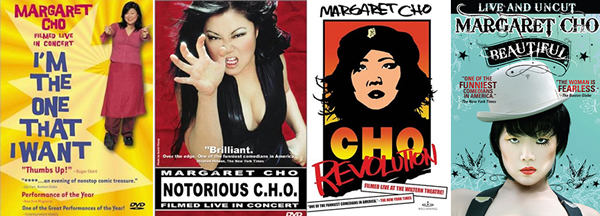 Jess: Growing up in San Francisco what was your earliest exposure to gay people?
Jess: Growing up in San Francisco what was your earliest exposure to gay people?
Margaret: Oh, I was exposed very early because my parents owned a bookstore in a gay neighborhood in San Francisco, so all of the people that I was in contact with when I was a very young child, maybe as early as 6 or 7 years old, were gay. I mean, it was not just one person, everybody I knew was gay. And also, interestingly enough, they were all tattooed, everybody was getting tattooed very early, like in the late 70’s, early 80’s. That was a trend in my small community. So, I was in the gay community from very, very young, as soon as I understood what gay was, which even then it took me a while to get it.
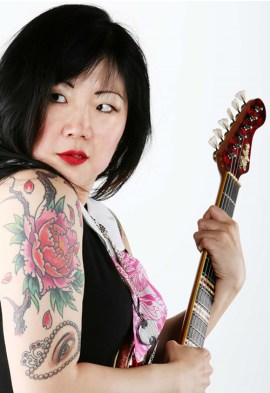 Jess: Over the past 10 years you’ve slowly tattooed a great deal of your body. Have you ever gotten a tattoo that you later regretted?
Jess: Over the past 10 years you’ve slowly tattooed a great deal of your body. Have you ever gotten a tattoo that you later regretted?
Margaret: No, not one particular tattoo. I do, in a sense, always want to start over. I mean I’ve always wanted to be tattooed and I’ve always wanted to have this on my skin since I was exposed to it as a child. But, now you look at Jon Gosselin’s big back piece and you go, oh you kind of look like an asshole! I realize that my history with tattoos is different than Jon Gosselin’s, but… it’s kind of embarrassing! [laughs]
Jess: Aside from Jon Gosselin, have you ever seen a tattoo someone and thought, “wow, that is the worst tattoo I’ve ever seen?”
Margaret: No, I think everybody who adorns their body… it’s very tribal and it’s very interesting, but I always wonder what is worth somebody’s pain. Tattoos are also a very physically a painful ritual, it’s very painful art, so I always want to know, what is worth that suffering? I think all of them are beautiful to some extent, you know there are some that aesthetically don’t make sense to me, that don’t fit my particular aesthetic, but I think they’re all great.
Jess: I remember reading your blog on being a Christian. What would your advice be for people who have a strong faith and are gay and feel torn?
Margaret: I think that they can seek out a church that does not reject them. There are plenty of places of worship that don’t discriminate against gays and lesbians. I think it’s really important for those people to know that you don’t have to leave the faith or become an atheist just because your church is discriminating against you. I also don’t think it’s very healthy to stay in that church… why be in a community that doesn’t accept you wholeheartedly? And, I think there are so many different kinds of churches that would accept who are gay. To me, it’s a ludicrous idea anyway that churches are against gays. It doesn’t make any sense to me, so I think that there’s a lot of places where you can take your spirituality, and take your relationship with God, and make sure that you don’t feel victimized.
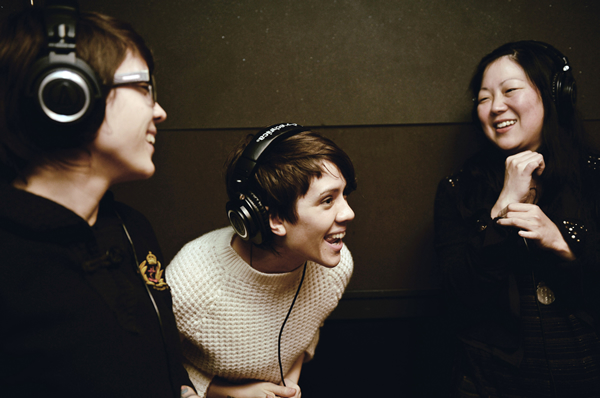
Jess: Comedy albums tend to go for funny lyrics set to generic tunes. I was really impressed how the songs are actually quite catchy and fully produced. If the lyrics weren’t comedic your song with Tegan & Sara would fit right in on So Jealous or The Con. Same with Fiona Apple, Ani DiFranco, etc. How’d you talk all these amazing performers into collaborating for a comedy album?
Margaret: Well, I’m a fan of everybody on the record, and I approached everybody in a different way. Some people I had known for many years, and others I met through the process of making a record. So, like with Tegan & Sara, I’d been a big fan of theirs for a long time and we had attended each other’s shows, so I definitely wanted to do a song with them when I first started making the album. I wanted to make an album that was funny, but at the same time had a high production value in terms of music, where each song sounded as if this is what happened when I joined that band for a day. Same thing with Fiona Apple and Ani DiFranco – these are the songs that I made with each of these artists who I love and got to join their band. Everybody had a different way of working, but every collaboration was really satisfying and exciting.
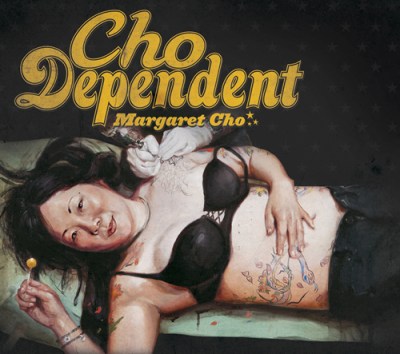
Jess: Who were you a superfan of growing up?
Margaret: I always loved Steve Martin and Richard Pryor, as comedians they were really important to me. Also, Joan Rivers was a big deal, I really loved her and still do, she’s great. Musically, the first concert I went to was The Go-Go’s and I’m still a huge fan of theirs, and they were very influential and made me think that we, as girls, could really do anything we wanted. It was so empowering to see them play, and to see them play their instruments, that was just a really great thing.
Jess: What do you make of the crew of female comics who have come out later in their careers?
Margaret: Well, people have different reasons for when and why they come out and what will make an impact. Sometimes when somebody comes out it makes a tremendous impact on society, so in those cases it’s very helpful later on in their careers, as opposed to if they were always out to begin with. I don’t know if it would make as big of an impact [for a career just starting].  I think about Ellen DeGeneres and when she came out, what a big huge deal that was, and how it really changed the way that middle America viewed lesbians. That was really powerful, and maybe that wouldn’t have had such an impact if she had been out all along. The other person I think about is Wanda Sykes, who I love, and she came out in order to further the fight against Prop 8, which I think is very admirable. So, people have different reasons and different times where it’s appropriate for them, and it makes an impact on society then.
I think about Ellen DeGeneres and when she came out, what a big huge deal that was, and how it really changed the way that middle America viewed lesbians. That was really powerful, and maybe that wouldn’t have had such an impact if she had been out all along. The other person I think about is Wanda Sykes, who I love, and she came out in order to further the fight against Prop 8, which I think is very admirable. So, people have different reasons and different times where it’s appropriate for them, and it makes an impact on society then.
Jess: Joan Rivers recently said in an interview that young performers should still keep their sexuality a secret. She mentioned that it was smart of Ricky Martin to wait until the height of his success was over to come out.
Margaret: Ideally I think everybody should be out all the time. That would solve so many problems, if people would just come out from the get-go. But I don’t know how our society would support that, like I don’t know how much homophobia exists within our society. What I do know is that a lot of times when people come out, the responsibility isn’t just about coming out. When you come out in today’s society you have to also become an activist, and a lot of times that activist role is something that people don’t want to play in addition to being an artist. So, I think it’s a personal preference. I feel like everybody’s got their own idea of who they want to exhibit themselves as, what level they want to do, what they want to be seen as.
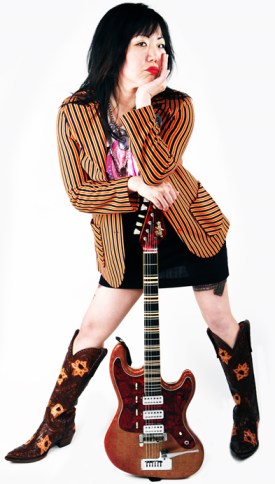 Jess: This reminds me of Adam Lambert, who waited until American Idol was over but made it clear that he didn’t want to talk about gay political and civil rights issues. He’s stressed that he’s an entertainer and not a politician, which hopefully will relax other celebrities who stay closeted because of that pressure.
Jess: This reminds me of Adam Lambert, who waited until American Idol was over but made it clear that he didn’t want to talk about gay political and civil rights issues. He’s stressed that he’s an entertainer and not a politician, which hopefully will relax other celebrities who stay closeted because of that pressure.
Margaret: Right! And he also strikes me as somebody who was also out to begin with. I mean, his stardom was so fast… Like he barely… He was a star, and then a couple of weeks later he was, ‘I’m gay!’ [laughing] He only waited like 2 weeks and, ‘I’m gay!’ Like, it was real fast! So, I wouldn’t necessarily think of that as even waiting to come out, he was pretty much… I don’t know if I believe in the idea of sensation, but with somebody like that, they are an overnight sensation because the success of American Idol is really an overnight thing. His start was a little bit different than somebody like Ricky Martin, who was a child star and developed within show business. So, his idea of image has been protected since he was like, 5 years old or whenever he joined Menudo. So, I think it’s much more difficult for somebody like Ricky Martin to come out, especially, you know? His fame was many years before Adam Lambert, when you’re talking about Menudo, and then growing up gay as a very, very important Latin recording artist. You know the Latin culture is not as accepting, of course, and it’s very difficult. I think his finally coming out now is really brave, even though it is years later.
Jess: Fran Drescher recently mentioned that the man she was married to for 21 years turned out to be gay. Have you ever unwittingly dated a gay man?
Margaret: Not unwittingly, no. I very consciously dated many, many gay men.
Jess: Really?
Margaret: Even though it’s weird considering my stand-up comedy, I can also be a very non-sexual person. And, sometimes gay men are very romantically interested in me, but not sexually. But romantically, which is a different thing, too. So I’ve actually had quite a few romantic relationships with gay men that are not sexual at all. But in the realm of romance I think that there’s like, many gay men that have sought that of me. Because for gay men, also the idea of romance is sometimes neglected in gay culture. It’s a very kind of feminine ritual, a feminine trait or a feminine ideal of romance, and so I think many gay men who have indulged that with me, not in a sexual way, but in a romantic way. So, I have quite a few gay “husbands”, I think there’s different ways to be a ”husband”, there’s different ways to have “marriage”, and now I’ve certainly had that with quite a few gay men.
.
Jess: And what do you get out of it?
Margaret: Oh, I get a lot out of it! I mean, I get a lot of very satisfying connections, and a heart connection, and a love connection. There is love there, just because that isn’t sexual doesn’t mean it’s not as profound and loving as a relationship that I would have with somebody that I am sexual with.
Jess: Isn’t that just a friendship?
Margaret: It is a friendship. But romance is a kind of modified friendship. It sort of goes a little deeper. If you’re not involving sexuality, I think, for me, relationships can be a lot deeper. You can get into a spiritual realm, and that’s really deep, so I’m very happy with my relationships with gay men. Maybe it’s sort of what Elizabeth Taylor and Montgomery Clift had, a very romantic relationship that wasn’t sexual, but that was very deep.
Jess: I think a lot of people may not be aware that you’re actually married to a man. I know when Ani Difranco got married she experienced some backlash from the gay community. Did you ever experience anything like that?
Margaret: No, I don’t think so. I think because I’ve always had a side of me that’s very heterosexual too, that it’s not… I identify as queer, my politics are queer, but then I’ve also maintained many relationships with men too, so I think my own fluidity within my own sexuality has always been very present. So I didn’t feel a kind of backlash in that same way, which I thought for Ani was very unfair. She was very happy, and she should have been congratulated, so I don’t think that’s right that there was backlash for that. I think people, when they identify so much with her music, and they equate so much of that with their own queerness, they feel like the artist has a responsibility to answer to it with their actions in life, and I don’t think that’s appropriate.
+
Jess: Were you a fan of either Queer As Folk or The L Word?
Margaret: Oh, I loved them both, yes! I loved them both and I have them all on DVD and I adore them. They’re both great series.
Jess: Who were your favorite characters on each?
Margaret: I love Shane and I love Brian [laughs].
Jess: [laughs] Right? I get the connection.
Margaret: Yeah, they’re like the sharks, which are my favorite!
Jess: Your episode of Sex and the City is one of my favorite things ever.
Margaret: Oh, that was a lot of fun, I was really excited to be on that show because I was such a fan of the show. It’s really very rare when that happens, when you get to be super into a show and then you can step into that show, it’s really amazing. It was also the first time I ever saw anybody use a Blackberry… it was Sarah Jessica Parker on set. She was texting and I’d never seen anybody text before and it was really fascinating! [laughing] I was like a gorilla, watching her text, like “ooh I’m gonna do that someday!” I was like a monkey wanting to do whatever she was doing.
+
Jess: What’s your favorite Lady Gaga song?
Margaret: I love Bad Romance, and I love Telephone because I love the video. And I love her, I think she’s great. She is such a bizarre kind of a pop star. She’s just got her own thing happening, and I just think she is so phenomenal. She’s great for queer culture, she’s really innovative and beautiful, and I think she’s a great musician too, so I have a lot of respect and love for Gaga.
Jess: Do you have any ideas of who you think might really tap into the queer community the way Lady Gaga did? To me, Lady Gaga is the gayest thing on the planet, I can’t believe she is as mainstream as she is because it’s so gay.
Margaret: I know, she’s so queer!
Jess: Everything about it is gay. Are there any other acts like that that you know of coming up that you think might be able to tap into that same realm?
Margaret: Kevin Barnes from Of Montreal is someone who I like a lot who is very queer… He reminds me of David Bowie in a lot of ways. He identifies as bisexual, but he is also married and has a child and he lives in the South and his music is so innovative and wild and creative and different… he is like this combination of David Bowie and Prince. He’s so popular in the indie rock scene, which is all abuzz about Of Montreal and everybody loves them. I generally think of indie rock as being very straight and very hetero, so that’s what’s really cool about Of Montreal… I’m a big fan of theirs. Actually Jon Brion, as a gift to me, had Kevin Barnes play bass on one of our songs on the record. That’s the best gift you can give, somebody who I admire, to get him to play on my song. But I think of him as being a real contender for the next Gaga [laughing].








Comments
i wish jon brion would give me a gift. he’s one of my fave producers and i haven’t thought of him in 100 years. thanks jess/margaret! great interview :)
I’ve seen/own everything Margaret Cho except Drop Dead Diva. Not sure why I didn’t get into that one. I even own Bam Bam & Celeste, the ridiculous comedy (put out by Wolfe Video) also costarring Jane Lynch and Alan Cumming.
http://www.wolfevideo.com/products/bam-bam-celeste/
She really is one of my heroes!
I LOVED ALL-AMERICAN GIRL and was really depressed when it got canceled. I just wanted to share that with the group.
ok LISTEN. it’s not that i’m objectifying margaret cho, because i’m not. I’M NOT. but i do want to say that if i’d done this interview, i would’ve asked her if we could make plans to maybe, one night, take off all of our clothes and sort of, like, smash ourselves together and maybe cut the friction with some sort of water-based lubrication and a bottle of champagne (which she would have to buy b/c i’m BROKE) and then afterward, eat some noodles together? still naked. and not because she’s asian and asians love noodles but b/c I LOVE NOODLES and i think it’d be so much fun to eat noodles, naked, with margaret cho. i mean, don’t you?
failing that plan, i think it would also be fun to go dildo shopping with margaret (we’re on a first-name basis now b/c i just imagined having platonic, mildly kinky sex with her, so). i recently went dildo shopping with a friend of mine in brooklyn and it was FUN. maybe i’ll write about that one day. anyway i think margaret would be really hilarious in babeland, right? like, REALLY hilarious.
and for the record, i really like all of her tattoos. all the ones i’ve seen, i mean. and steve martin really is super funny. great interview, jess!
I wish I had words to sum up how perfect this comment is. I really do, but I don’t think they exist in the English language (which is, consequentially, the only one i know. but may they exist in a different language like, french or something).
this is the best response to anything ever…
LOL. this is the greatest thing ever! And as a fellow Asian, I’d just like to say how appreciative I am whenever I meet anyone (asian or not) willing to eat noodles with me. :P
Dear Autostraddle, could Laneia please win a You’re Awesome comment award for this? Tx
What a fantastic interview, Jess!
glad you liked it, Rachel!
Awesome interview! I love Margaret Cho, everything about her. Especially the impressions she does of her mother.
I would LOVE to see Margaret live one day… <3
Great interview!
She is so much fun live!
She’s on tour this summer… go get it, girl!
She came to my college when I was still in school. It was like a freaking religious experience I swear.
Absolutely love Ms.Cho! She is a delight on Drop Dead Diva, and I’m glad she mentioned Adam Lambert, to whom I will happily confess to be a total fan. But I loved Margaret before all that and will seek her out wherever she is on TV.
i have read this article more than once and i love it. does the “you rock and i’m doing the happy clap:: dance for jess.
i think it’s interesting (ok tangent here i come) that female entertainers like Cho and Gaga (cuz last name basis rocks blocks) can run the queer playing field like seasoned quarterbacks.
male performers can’t really get away with it without just being labeled straight up gay, u know? and it’s so much more exciting, especially for artists, to kinda get all crazy somewhere in between all our notions of gay, straight, bi boundaries
also, they blur this delicious line by existing and performing in a queer space they create for themselves and not some pre-determined stereotypical gay space, am i making any sense?
and margaret cho takes on a queer ethnic space that fucking engages you and pulls you into her life and her body without making the same f*cking jokes that so many other comics of color do.
im so tired of
“white people eat cheese sandwhiches”
“but us black people eat ::insert stereotypical comedic response here::
or us Latinos do this…
you know? she brings it home and we all feel like we live in her house and are at the club with her.
and i fucking love her for it.
Totally agree with you re: gaga & cho as quarterbacks. The term “gay icon” gets thrown around a lot but I really feel that people like them, Cyndi Lauper & Kathy Griffin REALLY go to bat for our community whereas other gay icons like Madonna, Cher, Britney (god help us) etc just seem to enjoy & reap the benefits of being adored by the gays. ya know?
Great Interview! I loved Margaret before but now I think I love her even more.
This was a really great interview.
That was a great interview, and Margaret Cho is so smart. I love her!
If any of you haven’t seen Beautiful yet, you need to watch it. You’ll laugh more than the first time you ever smoked bud.
Jess, as always, great interview.
I love this interview as well, but I’ve read a zillion (OK, maybe a million) interviews with Kevin Barnes from Of Montreal and he always said he was straight. So I don’t know if Margaret is sharing personal knowledge here. He definitely has a queer sensibility.
I love her comment on romantic friendships! I’ve a couple of friendships that are like that – not sexual, but quite emotionally intense, and sometimes quite affectionate. It’s quite a lovely place to me. Sometimes a little frustrating when you end up having the hots for them and they’re not into you/your gender that way, but the emotional depth and intimacy makes up for that.
also: y’all haven’t met my friend Adam (not Lambert). Gayest gay man that ever gayed. He’s like the walking stereotype of GAAAAAAAAY. And lovely to boot.
Margaret is one of the kindest, sweetest comedians in the entertainment industry. I can’t wait for her album to finally come out in August!
“I think there’s different ways to be a ”husband”, there’s different ways to have “marriage”, and now I’ve certainly had that with quite a few gay men”
“There is love there, just because that isn’t sexual doesn’t mean it’s not as profound and loving as a relationship that I would have with somebody that I am sexual with”
I realise this is a very old article, but I have just made an account purely so I can squeal over these quotes, because YES!! As an asexual, I can’t begin to describe how fantastic it is to see someone I admire talk about how romantic and sexual love aren’t always connected. And on a queer website as well! Asexuals are so often pushed out of queer spaces, and while this interview obviously isn’t about asexuality, there’s so little dialogue on this sort of love I am perfectly happy to grasp at any hint of it.
“Isn’t that just a friendship?” Ouch, that one hurt.